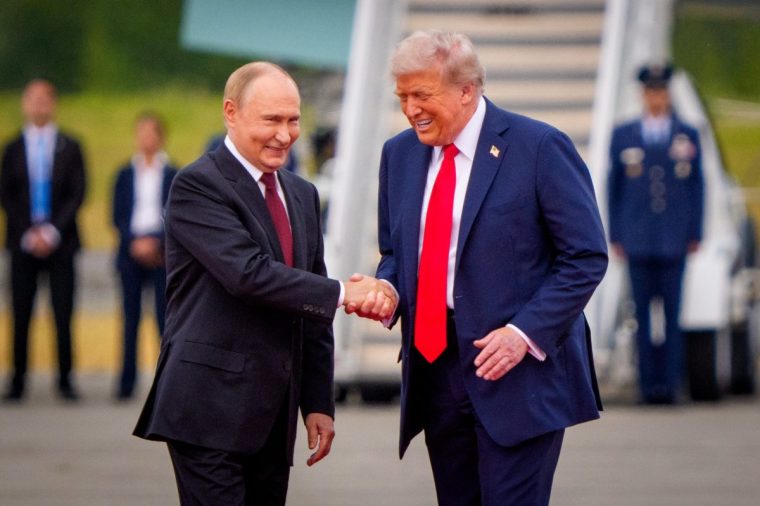The peace summit has yet to bring peace, a substantive agreement for Ukraine or sanctions for Putin – yet Kyiv smoulders
WASHINGTON DC – Exactly a fortnight after Donald Trump warmly welcomed Russia’s president Vladimir Putin to Alaska for their summit on Ukraine, the peace initiatives he hoped to kickstart have yet to materialise.
On Thursday, Russia launched one of its most powerful assaults on Kyiv since the war began in February 2022. At least 23 civilians were killed in the drone and missile assault, with explosives raining down on the Ukrainian capital. Among those complexes struck, the European Union’s diplomatic offices and the Kyiv headquarters of the British Council.
Last week, the Russians also destroyed an American-owned electronics manufacturing plant in western Ukraine, suggesting – as an American TV interviewer put it to the Kremlin’s Foreign Minister Sergei Lavrov last weekend – that either Moscow is deliberately striking at US and European targets, or its military officers are very bad shots.
On Friday, stung by the latest violence against his capital, President Volodymyr Zelensky threw a fresh spanner in the diplomatic works. He rejected proposals for a buffer zone to be created between Russia and Ukraine in the event that the Kremlin’s war comes to an end.

Zelensky’s dismissal of the idea creates a fresh quandary for European leaders – including Sir Keir Starmer – who have reportedly discussed creating a 25-mile buffer to separate the warring armies.
Zelensky argues the idea is rooted in an earlier era of outmoded warfare. “Only those who do not understand the technological state of today’s conflict propose a buffer zone,” he told reporters.
Zelensky argues a de facto line of control separating the two militaries is already operational, thanks to the threat of mutual drone strikes against each other. “Today, our heavy weapons are located at a distance of more than 10km from each other, because everything is hit by drones,” he argued. “I call it a dead zone…it already exists.”

The Ukrainian president remains implacably opposed to Putin’s demand for the surrender of the entire eastern Donbas region of Ukraine, a position that Trump has endorsed in the days since his journey to Alaska. Zelensky’s demands for any peace negotiation revolve around the need to guarantee the existence of a large, well-supplied and highly trained Ukrainian army. He wants commitments from Nato leaders to protect his country in the case of further Russian aggression. He is also demanding frozen Russian assets be used for the reconstruction of Ukraine.
As US Special Envoy Steve Witkoff welcomed Ukrainian officials to New York for another round of discussions, he said his talks with Zelensky’s Chief of Staff, Andriy Yermiak, were “productive and constructive”. On the Ukrainian side, Zelensky replaced his ambassador to the US, emphasising the role should advance US-Ukraine defence agreements, but still no bilateral remains in sight.

President of France Emmanuel Macron was lobbing fresh criticism of Trump’s overtures from the sidelines. After meeting Germay’s Chancellor Freidrich Merz in Toulon, Macron said: “President Putin played President Trump in Alaska.”
Observing that Monday is the deadline Trump set for Putin to hold a face-to-face meeting with Zelensky, Merz said it is “obvious” now that no bilateral meeting is going to occur.
There is no expectation in Washington of any imminent announcement of the “very severe consequences” that Trump has previously threatened as a punishment for Russian intransigence.
At a White House event last Monday, Trump described himself as “very angry” over continuing Russian attacks on Ukraine. But he also said “we’re going to get the war done”, and praised Putin for traveling to Alaska, calling the summit “a big statement that he wants to get it done”.
There were reports that Trump was considering introducing private US contractors as part of a long-term peace plan in order to help re-build front line defence and protect US assets and businesses.
On Capitol Hill, many Republican lawmakers lack his optimism, and continue to prepare legislation to impose additional sanctions on Moscow and countries that purchase Russia’s oil. But Trump has prevaricated all year about whether he will ever sign those measures into law.
A fortnight after he abandoned his effort to secure a short-term ceasefire and decided to push for a full-scale peace agreement, Trump’s initiative has found no purchase whatsoever in Moscow, and faced hard limits on Ukraine’s willingness to compromise with the country’s assailants.
